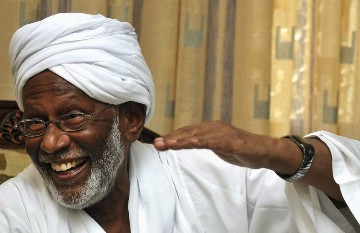Turabi’s party accepts dialogue with Sudan’s ruling NCP
February 11, 2014 (KHARTOUM) – Sudan’s opposition Popular Congress Party (PCP) led by Hassan Al-Turabi has announced its acceptance to engage in dialogue with the ruling National Congress Party (NCP).

Late last month, the Sudanese president delivered a speech in which he announced a four-point plan for reform “to stop the war and bring peace, free political society, fight against poverty and revitalize national identity”.
In a speech attended by Turabi and Sadiq Al-Mahdi, Bashir further called on political forces to engage in dialogue for the implementation items though he did not specify practical steps to do so.
The PCP political secretary, Kamal Omer, in a press conference on Tuesday unveiled his party’s decision to dialogue with the ruling party amid wide resentment among the opposition alliance forces.
Kamal Omer further criticized several forces within the opposition National Consensus Forces (NCF) for setting preconditions to engage in dialogue with the ruling party, adding “those conditions are illogical and unacceptable”, and called upon them to participate in the dialogue and then set their conditions.
Sudan’s opposition parties refuses NCP call for dialogue and instead propose forming a transitional government and holding a national conference with the participation of rebel groups to discuss a peaceful solution for the conflicts in Darfur region, South Kordofan, and Blue Nile states.
The interim government, in accordance with the opposition platform, would organise general elections once a political agreement on constitutional matters is reached, inaugurating a new democratic regime. But the NCP rejects this proposal saying opposition parties must simply prepare for the 2015 elections and that rebels should sign first peace accords.
Kamal Omer said his party accepted president Bashir’s recent initiative for holding a national dialogue without preconditions in order to urge the NCP to accept a transitional period with the participation of all political forces.
He further acknowledged the NCP’s previous history of betraying promises with political parties, but mentioned that there are now “objective changes within the regime” including the increasing calls for reform, last year coup attempt, and the recent cabinet shakeup which saw the departure of the leading figures who sparked differences with the PCP.
Leading figures with the opposition alliance NCF commented in statements to Sudan Tribune on conditions of anonymity on the political shift of Turabi party and dmitted that PCP’s move would split the opposition considering it a blatant attempt to abandon its allies.
The same sources expressed surprise on Turabi’s move saying the Islamist leader was amongst those who mocked the leader of the opposition National Umma Party (NUP), Al-Sadiq Al-Mahdi, for initiating dialogue with the ruling party on the same issues which the PCP intends to discuss with the government.
It further went to suggest validity of rumours about existence of secret understandings between Turabi and the Sudanese president, Omer Hassan Al-Bashir, pointing Turabi has been warning for a long time against dangers of toppling the regime by force.
During his press conference, Kamal Omer, told reporters that their differences with the NCP were not personal and that they don’t hold personal grudges against NCP leaders.
He was alluding to a paper circulating within the party prepared by some of its members calling to reform the PCP and accusing Turabi of freezing the positions of the Islamist party form the ruling NCP because of his personal bitterness against former vice-president Ali Osman Taha and president Al-Bashir.
The PCP split from the NCP following 1999’s bitter power struggle between Bashir and Turabi, with the latter was ousted from his post as parliamentary speaker and the chairmanship of the ruling party alike.
Turabi later established the PCP and has since been a vociferous critic of the very regime whose army-backed seizure of power in 1989 he orchestrated.
Omer said the upcoming dialogue will test the credibility of the ruling party and would not last indefinitely and pointed that PCP saw “the present time is the right time for engaging in dialogue with the government” while the NUP initiated dialogue with it ahead of all political parties, adding each party has its own assessment.
Informed sources within the PCP told Sudan Tribune that failure of the opposition forces to agree on drafting the new constitution during the transitional period has encouraged the PCP’s move, pointing that it received positive signals that NCP could change many of its previous stances.
It also said the PCP received information about foreign influences but declined to go into details.
President Al-Bashir on Wednesday will meet with the leader of the Umma party Sadiq Al-Mahdi to discuss the position paper the latter prepared about the presidential initiative for national dialogue.
(ST)
